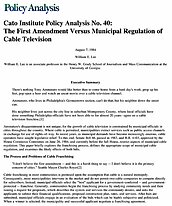The First Amendment Versus Municipal Regulation of Cable Television
There’s nothing Tony Ammaturo would like better than to come home from a hard day’s work, prop up his feet, pop open a beer and watch an uncut movie over a cable television channel.
Ammaturo, who lives in Philadelphia’s Germantown section, can’t do that, but his neighbor down the street can.
His neighbor lives just across the city line in suburban Montgomery County, where local officials have done something Philadelphia officials have not been able to for almost 20 years–agree on a cable television franchise.[1]
Ammaturo’s disappointment is not unique, for the growth of cable television is constrained by municipal officials in cities throughout the country. Where cable is permitted, municipalities extract services such as public access channels in exchange for use of rights-of-way. In recent years, as municipal demands have become increasingly onerous, cable operators have sought legislative relief. To this end, Senate Bill 66, passed in 1983, and H.R. 4103, approved by the House Commerce Committee on June 26, 1984, and currently before the full House, restrict aspects of municipal cable regulation. This paper briefly explores the franchising process, defines the appropriate scope of municipal cable regulation, and examines the likely effects of both bills.
About the Author

This work is licensed under a Creative Commons Attribution-NonCommercial-ShareAlike 4.0 International License.
